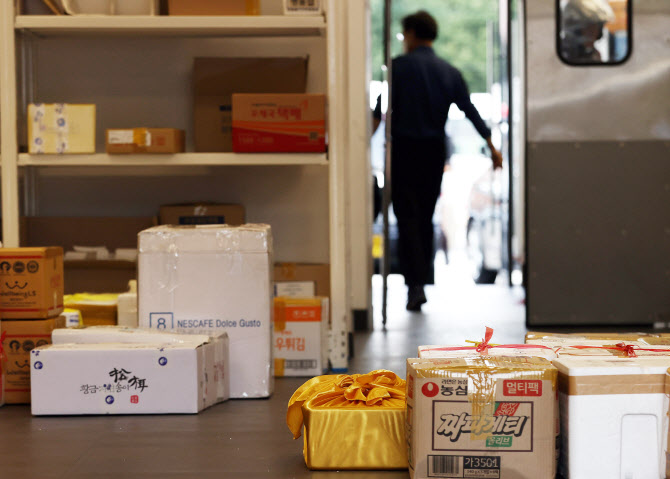|
Coronavirus worsens, urgent need to support agricultural and fisheries industry
According to the National Assembly on the 4th, the Agriculture, Forestry, Livestock, Food, Marine and Fisheries Committee will hold a general meeting soon and prepare a resolution demanding that the value of agricultural and fishery products be increased from 100,000 won to 200,000 won under the Solicitation Ban Act on this New Year’s Day and deliver it to the National Rights Committee.
Lee Gae-ho, chairman of the Agricultural and Marine Waters Commission, and Democratic Party lawmaker Lee Ga-ho said, “Comparing to Chuseok last year and now, the situation of Corona 19 has worsened rather than improved.” .
Currently, the Solicitation Ban Act restricts the value of futures for agricultural and livestock products to 100,000 won. Although the intent is to avoid expensive gifts for an innocent society, farmers and fishermen are appealing that the consumption of our agricultural and livestock products is limited, which makes management difficult.
As consumption contracted last year due to Corona 19 and it was impossible to visit their hometown, the Kwon Ik Committee temporarily increased the gift price to 200,000 won only on the Chuseok holiday.
|
The effect was great. According to the Ministry of Agriculture, Food and Rural Affairs, sales of agricultural and fishery food gifts of eight retailers (department stores, large marts, and home shopping) increased 7% year-on-year for a month before and after the Chuseok holiday last year (September 5 to October 4).
It is analyzed that the demand for sending gifts instead of going home has increased, but the scope of purchase has expanded due to the limit on the value of gifts under the solicitation ban. In fact, by price point at the time, the sales of futures exceeding 100,000 won to less than 200,000 won increased 10.3% year-on-year. The sales of livestock products such as Korean beef (4.9%) and fruits such as apples and pears (48.6%) increased significantly.
Agriculture and Food Minister Kim Hyun-soo also met with reporters before Chuseok on September 28 of last year and evaluated the increase in the upper limit of gifts under the Solicitation Ban Act, “the increase in sales of livestock products, fruits, and processed products had an effect of boosting demand.” The Kwon Ik Committee selected a case in which the price range of agricultural and fishery product gifts under the Solicitation Ban Act was temporarily adjusted as an active administrative best practice last year.
|
Also, the demand for “institutionalization of the institutionalization period up for each holiday”
The agricultural and fishery industry is also demanding an improvement in the system related to the value of agricultural and fishery futures. On the 15th of last month, the Korean Federation of Agricultural Business Owners (Nongyeon), a group of farmers, publicly proposed to revise the enforcement decree of the Solicitation Ban Act through the National Sinmungo, a public participation portal operated by the Rights Commission. The main goal was to increase the price of agricultural and livestock futures from 100,000 won to 200,000 won under the Solicitation Banning Act during the Lunar New Year and Chuseok holidays.
On the same day, the National Agricultural Cooperative Federation, the National Fisheries Cooperative Federation, and the National Forestry Cooperative Federation sent a joint recommendation urging to increase the cap on futures for agricultural and fisheries products.
In particular, it is argued that the faster the upgrade is decided, the greater the effect, with the situation about a month ahead of this Lunar New Year holiday. This is because in order to adjust the range of futures price, the KFTC must go through various procedures, such as deciding to amend the enforcement ordinance.
During the Chuseok of last year, the day when the Kwon Ik Committee increased the value of gifts was September 10th, leaving the 30th of the Chuseok holiday on the 20th. They pointed out that there was not enough time to respond to futures price adjustments, considering that companies usually complete the composition of futures a month before the holiday.
The agriculture and fishery industry argues that this year, the value of the gift should be increased in advance of a month or more before the Lunar New Year holiday (February 11-14). In addition, in order to resolve uncertainties, it is a position that the futures price should be raised every holiday.
An official from the Hannong Research Institute said, “Due to changes in the environment and conditions, such as the expansion of the agricultural and livestock market, consumption of domestic agricultural products continues to decrease, and the dependence on the holiday stock market continues to increase.” I will.
The Kwonik Committee is still in a cautious position. In a recent interview with E-Daily, Chairman Jeon Hyun-hee, Chairman Kwon Ik, said, “Many people sympathize with the last (Chuseok) decision and it is evaluated that it was helpful for the economy, but the KFTC broke the principle and did not play a proper role as an anti-corruption control tower. There were many criticisms that it was not possible,” he said. “All values must be carefully reviewed, public opinion gathered, and related agencies must be consulted.”



